The youngsters have successfully completed their initiation and are now regarded as men. The campsite where the initiates stayed is burnt after the initiation is completed.
Praying to Lord Shiva returned the sight I lost
Naveen Kumar
Hairdresser
I am a Hindu because my family is Hindu. My father always said it is important to hold on to who you are. I could never change my religion: God helps me all the time. I pray for help from Lord Shiva when I feel helpless. I once had a problem with my passport and visa – they said these were duplicates. Every day for five days I prayed, and then I was told the documents were original.
God gives us a lot of chances, but we must see these and use them. God is only good – he does not create evil. Men create evil – men write books that tell others to kill and steal. God gives gifts, but we waste them. Look at nature: it is bountiful, but we destroy it with pollution. We forget that everything we have is because Lord Shiva gives it to us. But you must work. You cannot just expect things from God – God works indirectly. He's in your hand and in your heart. If you ask and work, God will give.
In 2009 I was in a bike accident and hit my head. The doctors said muscles in my head were severed and I could no longer see. There was only darkness. They could not help me and said I must go overseas to seek a cure. But I was poor and could not. All we had was prayer. So my family and I prayed to Lord Shiva for help. Then, two months later, I started seeing some light. Six months and I could see again. Today I am working again, cutting hair. This could not happen without God's will. It is important that you work and pray every day, that you are thankful for what God gives you.
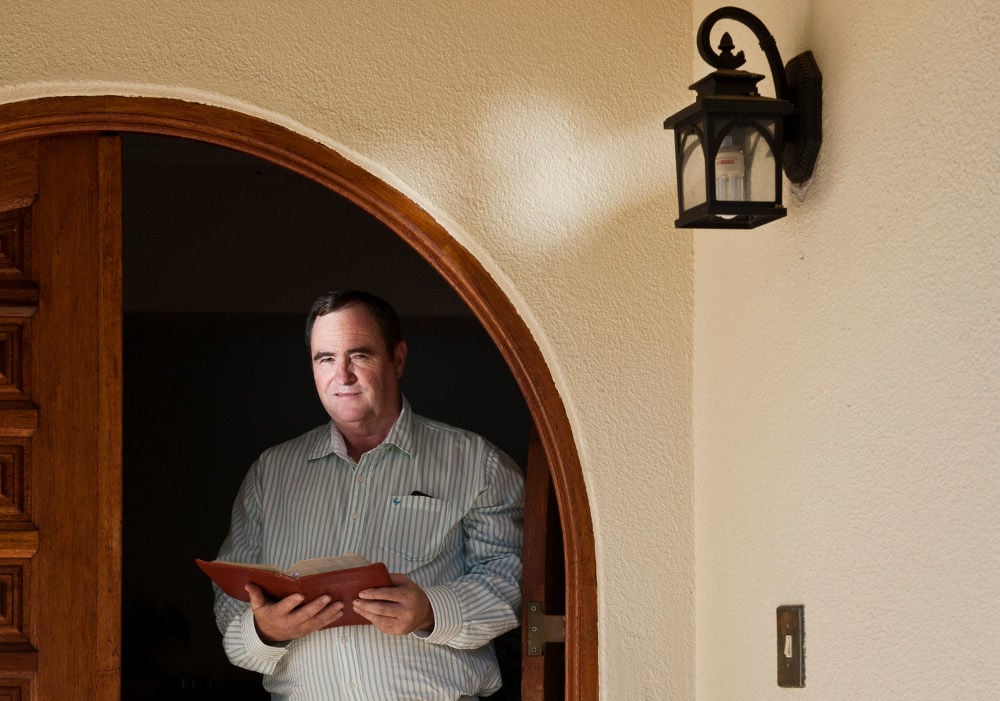
'It all belongs to God,' says Bryan Munro. (Madelene Cronje, M&G)
There is no coincidence, only God-incidence
Bryan Munroe
Consulting engineer
Central to my life is John 3:16: "For God so loved the world that he gave his one and only son that whoever believes in him shall not perish but have eternal life." This verse was quoted to me by a stranger many years ago and still has a major influence on me since. The working of his spirit in my heart caused me to realise that I was sinner and that God sent the world a saviour.
Although I grew up in a religious family, we were not particularly devout. Yet throughout my life God was there, working out his plan, sending out people as his messengers to give me prayer or guidance just when I needed it. There are many examples of God acting in my life. I do not believe in coincidence, but in God-incidence.
Everything I have is because of God, because nothing is really ours. It all belongs to God. Yet God gives out of his infinite love and wants us to be a part of it. This journey has taken me to other African countries and as far as India and Brazil. When I was in Brazil, I thought I would just be a bystander. But instead I was teamed with a pastor to do missionary work at a small village. It was not only a reminder that God wants me to spread his word, but we also experienced God's love among the people there, even though we couldn't always understand each other! What a privilege it is to serve Christ.
We must know God personally, as it affects our destiny. It is a relationship with God. And it is something I learned through hard lessons and tough times in life. But these times were also when God showed his grace and love. Every Christian is a work in progress, being made in Christ's likeness. We are his vessels, called to share the Lord with people who are in need.
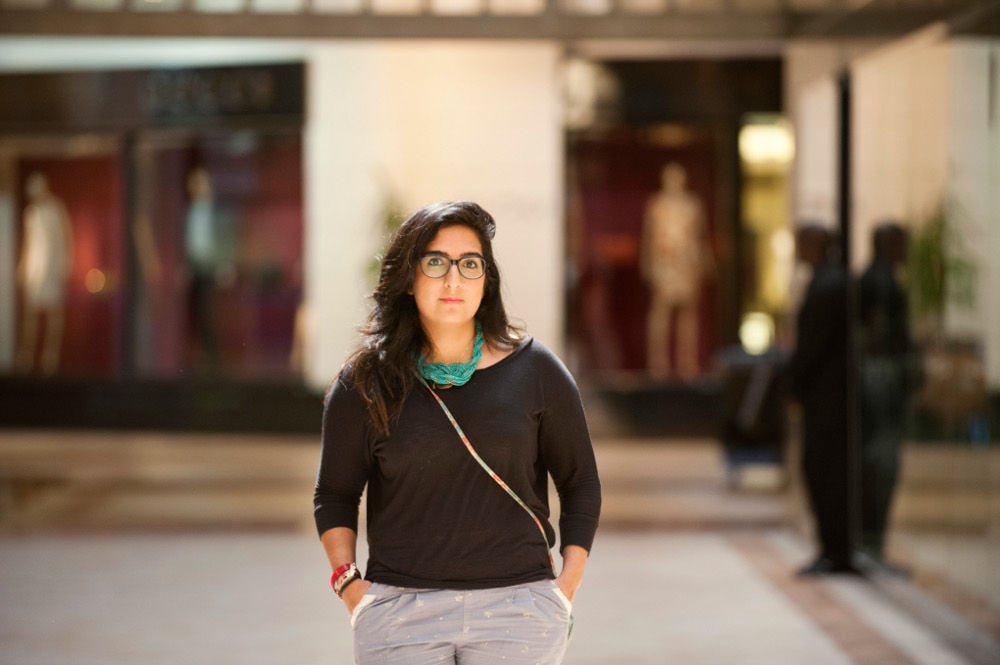
'It's your own journey,' says Yumna Muhammad. (Madelene Cronje, M&G)
The Koran reflects what the reader looks for
Yumna Muhammad
Journalist
I wasn't raised in a conservative religious family and we were encouraged to explore ideas that we discussed among each other. My mother has a particular interest in theology, so we were exposed to different religions and cultures. But Islam attracted me because it spoke to me on an individual level.
Spirituality is a very personal thing – it's your own journey – and you must find what resonates with you. For me, it began early in my teens, as several events in my life moulded my perspective on the world and my beliefs.
God is passive – he gives us free will and the space to explore our beliefs and spirituality. It is for our benefit, not his. This means that our beliefs evolve as we do. I once struggled with the idea that there are so many interpretations of the Koran: Why would God allow scripture that is so malleable? But then someone explained that the Koran is like a mirror: it reflects what the reader needs and searches for. This speaks to how personal your beliefs are and that ultimately your religion is a personal journey between you and God. For me Islam is a vehicle to that spirituality, where scriptures and rituals give me a structure, a path, for my relationship with God.
Islam is often viewed as a narrow, strict religion, but it is really
a very broad one that accommodates many philosophies and outlooks. My larger family is a microcosm of Islam's diversity – ranging from strong, stoic, orthodox believers
to very animated, joyously charismatic worshippers. There are small arguments from time to time, but everyone gets along. Many people don't realise that, like many religions, Islam accommodates many different views, because God wants us to
make it our own. No two people's relationships are the same and no two people have the same relationship with God.
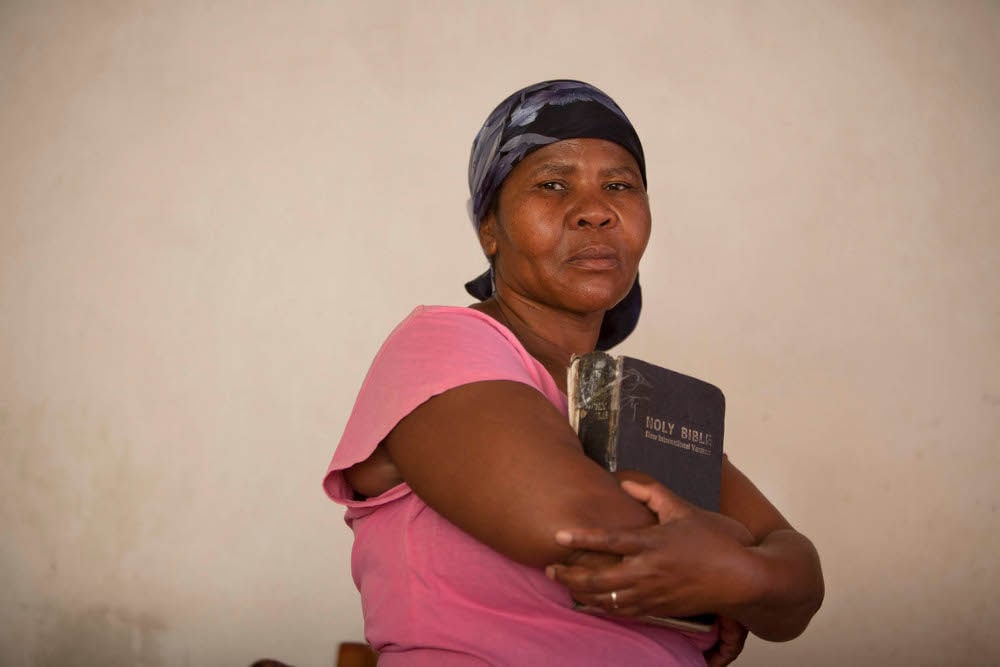
'Life without God would be too hard', says Anna Senooe. (Oupa Nkosi, M&G)
When times are hard I work harder to see God
Anna Senooe
Domestic worker
God is God – God is everything and everywhere and for everyone. Everywhere I look, I see God. And God comes to me – with good things and bad things. That is just God's way – it is part of his plan. In 2008 my husband died, but God was there for me then and has helped me to raise my children. Life can be very hard, but this is part of God's way. Life without God would be too much. Everything is possible with him, so when times are hard I work harder to keep seeing God in everything.
I was raised a Christian, but I first really saw God when I was at high school, during a service. I gave my heart to God and have followed him ever since. Sometimes it is hard for me to believe. Sometimes bad things happen to me, but most of the time I see bad things happen to other people. This is God's way to test us. God opens doors for us and sometimes a bad thing is a way to see these doors open.
When I see someone struggle, I talk to them and pray with them. On the street, in taxis or on trains – there are always strangers that need your help and prayers. And sometimes God will answer those prayers. I know because these strangers would come to me and say thank you for my prayers.
Churches are good for this. At church we can come together and help each other. Many people at my church do not have jobs. Sometimes even the pastor doesn't even have work. But we can come together and pray. South Africa needs God.
Many people live lives they shouldn't and it makes them unhappy. But God is always there, so we must listen and we must change our ways to follow God.
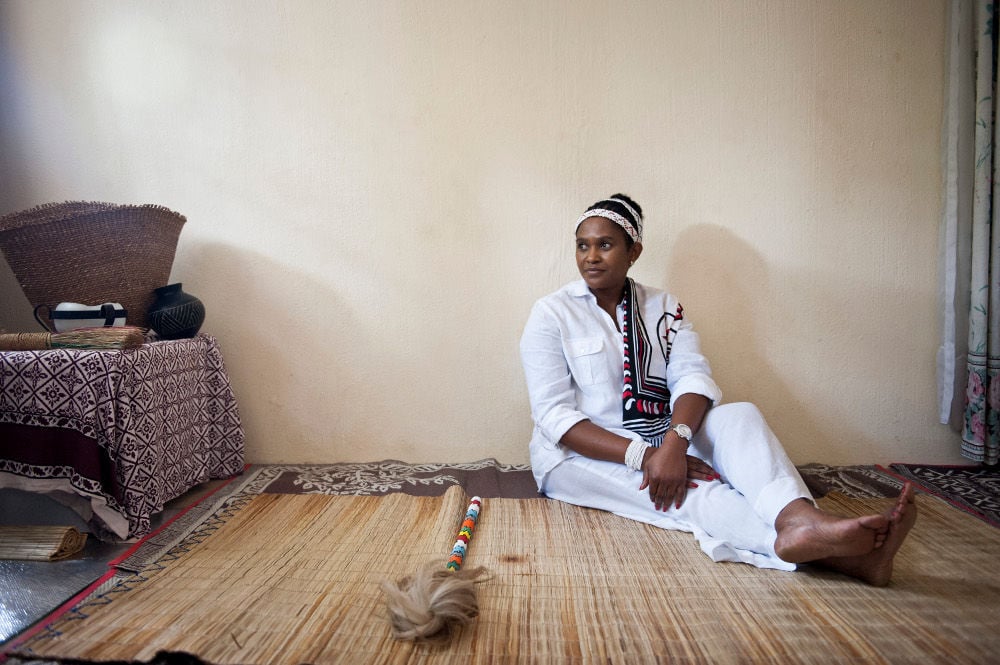
'I felt a higher power trying to reach me,' says Vella Maseko. (Madelene Cronje, M&G)
God called on me to become a sangoma
Vella Maseko
Clinical psychologist
Many find it odd that I am a sangoma and a clinical psychologist, because there is this misconception about traditional African spirituality. It is not a formal religion, but a way of life. God has always existed in African culture – Xhosas call him uQamata and Zulus call him Umvelinqangi.
Many African cultures see everything as connected and as unending. When someone dies, it is only their body that is left behind – their spirit ascends to a higher realm. There is no death, just a higher level of being – and because everything is connected, it is possible to communicate with the spirits and learn from their wisdom.
Unfortunately that has often been cast as witchcraft, which is completely wrong. I personally never believed in it. I was raised in a Christian family – and I do still consider myself a Christian. But at a point in my life I felt a higher power trying to reach me, connecting to me through spirits, using dreams and symbolic objects.
They were persistent! I remember waking up at night, as if someone is calling me. I'd loudly say: "Please go away – I'm trying to sleep!" But a series of events pushed me to explore these things more. All people are called for something and I believe God was calling on me to become a healer – a sangoma.
You have to understand – I was a student of psychology. I hold science and rational thought in very high regard. I also have my Christian side. So this transition created great conflict inside me and friction with others. I even isolated myself from the world for a while. But ultimately I learned that you should embrace all of who you are – that true happiness lies in acceptance of yourself and the journey you are on.
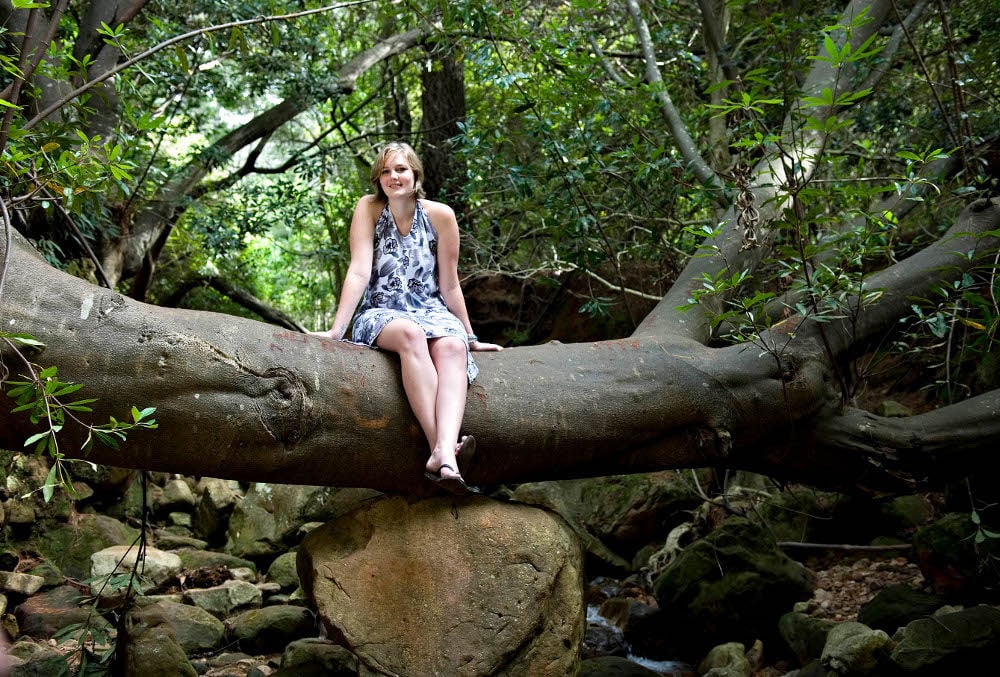
'Wicca is a nature-based belief that celebrates balance,' says Philippa Wade. (David Harrison, M&G)
In Wicca, you are responsible for your own life
Philippa Wade
Student
Wicca has been painted with a harsh brush. When I first spoke to my parents about it, my mother reacted with shock – convinced that it's just witchcraft.
Sadly, that is an image that popular culture has stuck to. But Wicca is a nature-based belief that celebrates balance. It's highly personalised: every Wiccan follows their own path. I'm an eclectic Wiccan – I incorporate many things I learn into how I perceive the world.
Wicca is a powerful religion, because it puts the responsibility of your life in your own hands. It's a path of self-discovery.
I first encountered the ideas of Wicca when I was 13. I found a book about it and even though it was thrilling, I felt embarrassed. We were raised as Christians, so the idea of spells and rituals seemed dangerous and wrong.
I eventually got rid of that book and forgot about it. But every one of us has a unique spiritual path and I found myself introduced again to Wicca when I visited the United States several years later. There I met a fantastic community of Wiccans – quite by accident – and I began to realise that this is the way for me. Now I focus on bringing together Wiccans in Cape Town with my group Wiccans of the Light.
There are deities in Wicca, but they vary from person to person. These are just symbols for a larger power that we are all a part of. Everything around us is a projection of that power, including us. So when invoking a deity, it's just a symbol to connect to the energy around us. And rituals, like meditation or prayer, are there to align your thoughts and being with those energies.
Still, Wicca is not for everyone – every belief is its own path and it's your purpose to find that.